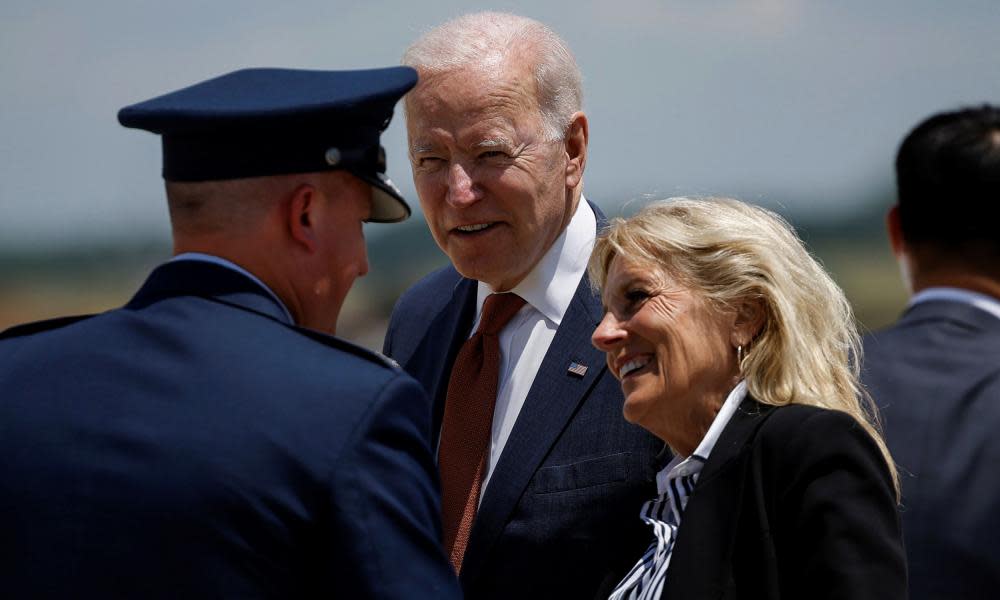Biden trumpets democracy abroad in Post op-ed – as threats spread at home

- Oops!Something went wrong.Please try again later.
- Oops!Something went wrong.Please try again later.
- Oops!Something went wrong.Please try again later.
- Oops!Something went wrong.Please try again later.
Joe Biden will use his visit to Europe this week to “rally the world’s democracies” in a reset of US foreign policy after four turbulent years under Donald Trump – all while threats to American democracy, stoked by Trump, proliferate at home.
Related: After Trump: Biden set to outline US policy to Johnson, Putin and more
The president’s plan for the trip was set out in a column for the Washington Post on Saturday night, as Trump spoke to Republicans in North Carolina.
Previewing meetings with “many of our closest democratic partners” and Vladimir Putin, Biden promised to “demonstrate the capacity of democracies to both meet the challenges and deter the threats of this new age”.
Critics may point out that the president would do well to face up to attacks on democracy at home. He has put Kamala Harris in charge of the matter but there are many fronts to the battle.
In the states, Republicans have passed laws to restrict ballot access and to make it possible to overturn election results.
On the stump, Trump continues to peddle his lie that Biden’s victory in November was the result of fraud. In Greenville on Saturday, the former president called his defeat “the crime of the century”.
In Washington last month, Republicans in the Senate blocked a bipartisan commission to investigate the attack on the US Capitol on 6 January, by supporters Trump told to “fight like hell” in his cause.
In Biden’s own party, centrist senators stand in the way of voting rights protections.
In his column for the Post, Biden tied another domestic priority – infrastructure spending, currently tied up in seemingly doomed negotiations with Republicans – to a chief foreign policy aim.
Related: Biden’s push for racial justice at stake in bipartisan infrastructure talks
“Just as it does at home,” he wrote, “honing the ability of democracies to compete and protecting our people against unforeseen threats requires us to invest in infrastructure. The world’s major democracies will be offering a high-standard alternative to China for upgrading physical, digital and health infrastructure that is more resilient and supports global development.”
In North Carolina, Trump said China should pay the US and the world $10tn in reparations for its handling of the coronavirus outbreak, while nations should cancel debt to Beijing.
Biden touted domestic successes – progress against the coronavirus and the passage of his relief and stimulus package (without a single Republican vote) – and said: “The United States must lead the world from a position of strength.”
He saluted the announcement on Saturday by G7 finance ministers of a global minimum corporate tax rate. Further distancing himself from Trump, who withdrew from the Paris climate deal, he said: “We have an opportunity to deliver ambitious progress that curbs the climate crisis and creates jobs by driving a global clean-energy transition.”
In office, Trump attacked Nato. Biden saluted the “shared democratic values” of “the most successful alliance in world history. In Brussels, at the Nato summit, I will affirm the United States’ unwavering commitment to … ensuring our alliance is strong in the face of every challenge, including threats like cyberattacks on our critical infrastructure.”
Amid proliferating such attacks, he said, it was important that “when I meet with Vladimir Putin in Geneva, it will be after high-level discussions with friends, partners and allies who see the world through the same lens as the United States”.
Trump famously caused consternation among the US press corps in Helsinki in 2018, meeting Putin without aides and seeming cowed in his presence.
Biden said the US and its allies were “standing united to address Russia’s challenges to European security … and there will be no doubt about the resolve of the United States to defend our democratic values, which we cannot separate from our interests.”
Related: ‘Urgent need’: US to donate 750,000 Covid vaccine doses to Taiwan
Some have asked what Biden hopes to gain from meeting Putin – former Trump national security adviser John Bolton told the Guardian this week, “You meet when you have a strategy in place of how to deal with Russia and I don’t think he has one.”
In the Post, Biden heralded his extension of the New Start nuclear arms treaty and responses to cyberattacks.
“I will again underscore the commitment of the United States, Europe and like-minded democracies to stand up for human rights and dignity,” he wrote.
“This is a defining question of our time: can democracies come together to deliver real results for our people in a rapidly changing world? Will the democratic alliances and institutions that shaped so much of the last century prove their capacity against modern-day threats and adversaries?
“I believe the answer is yes. And this week in Europe, we have the chance to prove it.”

